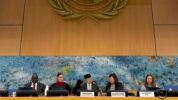Indonesia Faces 32% U.S. Import Tariff: Economists Urge Diplomacy and Reform
JAKARTA,RAKYAT NEWS – Indonesia is entering the latest phase of the trade war initiated by U.S. President Donald Trump, as the United States imposes a 32% import tariff on products from Indonesia. This development has thrust Indonesia into a challenging economic position, potentially exacerbating the ongoing global trade tensions. Economists have called for strategic approaches to address this situation and mitigate its impacts on the nation’s economy.
Telisa Aulia Falianty, an economist from the University of Indonesia’s Faculty of Economics and Business, recommended a comprehensive strategy involving negotiation, strengthening the competitiveness of export products, and domestic regulatory reform. She argued that retaliatory measures, such as imposing higher tariffs on U.S. products, would be counterproductive and could worsen the bilateral trade relationship between the two nations.
Falianty warned that retaliatory tariffs could lead to a domino effect, further escalating the trade war and adversely affecting Indonesia’s exports. Instead, she emphasized the importance of diplomatic negotiations and regulatory reforms as more sustainable solutions for addressing the tariff dispute with the U.S.
As a member of ASEAN, BRICS, and the G20, Indonesia is encouraged to leverage multilateral diplomacy to navigate this crisis. While President Trump has favored bilateral agreements, regional collective efforts could strengthen Indonesia’s bargaining position on the global stage. Falianty suggested that Indonesia should continue its multilateral diplomacy while enhancing the competitiveness of its domestic industries.
Key sectors, such as palm oil and textiles, which are in high demand in the U.S., can serve as critical components in maintaining trade channels with America. These sectors could help sustain communication and trade even as the tariff dispute unfolds. However, Falianty noted the possibility of trade diversion, with countries like China potentially redirecting their exports away from the U.S. due to similar trade restrictions.



























Tinggalkan Balasan